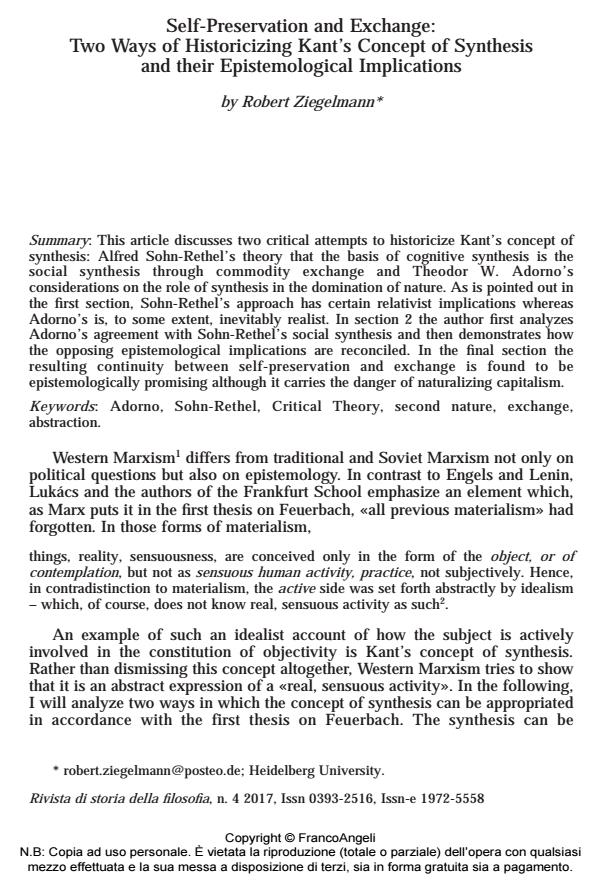Self-Preservation and Exchange: Two Ways of Historicizing Kant’s Concept of Synthesis and their Epistemological Implications
Titolo Rivista RIVISTA DI STORIA DELLA FILOSOFIA
Autori/Curatori Robert Ziegelmann
Anno di pubblicazione 2017 Fascicolo 2017/4 Lingua Inglese
Numero pagine 12 P. 617-628 Dimensione file 45 KB
DOI 10.3280/SF2017-004007
Il DOI è il codice a barre della proprietà intellettuale: per saperne di più
clicca qui
Qui sotto puoi vedere in anteprima la prima pagina di questo articolo.
Se questo articolo ti interessa, lo puoi acquistare (e scaricare in formato pdf) seguendo le facili indicazioni per acquistare il download credit. Acquista Download Credits per scaricare questo Articolo in formato PDF

FrancoAngeli è membro della Publishers International Linking Association, Inc (PILA)associazione indipendente e non profit per facilitare (attraverso i servizi tecnologici implementati da CrossRef.org) l’accesso degli studiosi ai contenuti digitali nelle pubblicazioni professionali e scientifiche
This article discusses two critical attempts to historicize Kant’s concept of synthesis: Alfred Sohn-Rethel’s theory that the basis of cognitive synthesis is the social synthesis through commodity exchange and Theodor W. Adorno’s considerations on the role of synthesis in the domination of nature. As is pointed out in the first section, Sohn-Rethel’s approach has certain relativist implications whereas Adorno’s is, to some extent, inevitably realist. In section 2 the author first analyzes Adorno’s agreement with Sohn-Rethel’s social synthesis and then demonstrates how the opposing epistemological implications are reconciled. In the final section the resulting continuity between self-preservation and exchange is found to be epistemologically promising although it carries the danger of naturalizing capitalism.
Keywords:Adorno, Sohn-Rethel, Critical Theory, second nature, exchange, abstraction.
- [Adorno] 1936: Theodor W. Adorno (under the pseudonym Hektor Rottweiler), Über Jazz, «Zeitschrift für Sozialforschung», Vol. 5, 1936, No. 2,, pp. 235-259.
- Adorno 1973: Theodor W. Adorno, Negative Dialectics, trans. E.B. (Ernst Basch) Ashton, Continuum, New York 1973.
- Adorno 1976: Id., Introduction, in Adorno et al., The Positivist Dispute in German Sociology, trans. Glyn Adey and David Frisby, Heinemann, London 1976, pp. 1-67.
- Adorno 1982: Id., Gesammelte Schriften, Band 17, Musikalische Schriften IV: Moments musicaux, Impromptus, Suhrkamp, Frankfurt 1982.
- Adorno 2002: Id., On Jazz, in Richard Leppert (ed.), Night Music. Essays on Music 1928-1962, University of California Press, Berkeley 2002, pp. 470-495.
- Adorno 2013: Id., Against Epistemology: A Metacritique. Studies in Husserl and the Phenomenological Antinomies, trans. Willis Domingo, Polity Press, Cambridge-Malden 2013.
- Adorno, Horkheimer 2002: Theodor W. Adorno and Max Horkheimer, Dialectic of Enlightenment. Philosophical Fragments, trans. Edmund Jephcott, Stanford University Press, Stanford 2002.
- Gödde 1991: Christoph Gödde (Hrsg.), Theodor W. Adorno und Alfred Sohn-Rethel. Briefwechsel 1936-1969, edition text+kritik, München 1991.
- Habermas 1984: Jürgen Habermas, The Theory of Communicative Action, Vol. 1, Reason and the Rationalization of Society, trans. Thomas McCarthy, Heinemann, London 1984.
- Jay 1984: Martin Jay, Marxism and Totality. The Adventures of a Concept from Lukács to Habermas, University of California Press, Berkeley-Los Angeles 1984.
- Kant 1987: Immanuel Kant, Critique of Pure Reason, trans. Paul Guyer and Allen Wood, Cambridge University Press, Cambridge-New York 1987. References in the standard pagination: “A” refers to the first edition of 1781 and “B” to the second of 1787.
- Lukács 1971: Georg Lukács, History and Class Consciousness. Studies in Marxist Dialectics, trans. Rodney Livingstone, MIT Press, Cambridge 1971.
- Marx 1976: Id., Theses on Feuerbach [Original version], Marx and Engels Collected Works, Vol. 5, Lawrence & Wishart, London 1976, pp. 3-5.
- Marx 1988: Id., Letter to Ludwig Kugelmann, London, 11 July 1868, Marx and Engels Collected Works, Vol. 43, Lawrence & Wishart, London 1988, pp. 67-70.
- Marx 1996: Id., Capital. A Critique of Political Economy. Vol. 1, Marx and Engels Collected Works, Vol. 35, Lawrence & Wishart, London 1996.
- Sohn-Rethel 1978: Alfred Sohn-Rethel, Intellectual and Manual Labour. A Critique of Epistemology. Macmillan, London-Basingstoke 1978.
- Vogel 1996: Steven Vogel, Against Nature. The Concept of Nature in Critical Theory, State University of New York Press, Albany 1996.
- Whitebook 1993: Joel Whitebook, From Schoenberg to Odysseus: Aesthetic, Psychic, and Social Synthesis in Adorno and Wellmer, «New German Critique», No. 58, 1993, pp. 45-64.
- Wood 2002: Ellen Meiksins Wood, The Origin of Capitalism. A Longer View. Verso, London-New York 2002.
Robert Ziegelmann, Self-Preservation and Exchange: Two Ways of Historicizing Kant’s Concept of Synthesis and their Epistemological Implications in "RIVISTA DI STORIA DELLA FILOSOFIA" 4/2017, pp 617-628, DOI: 10.3280/SF2017-004007